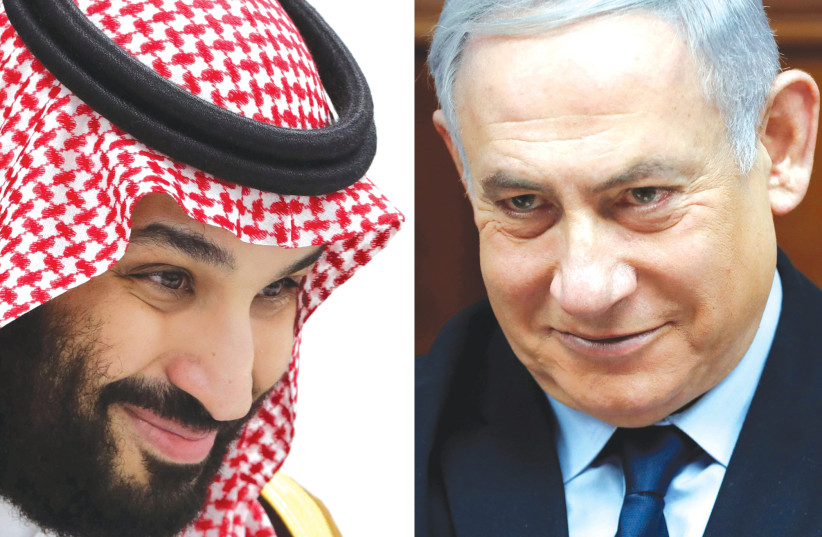‘Saudi uranium enrichment will spark a nuclear arms race,’ Lapid says
Opposition leader Yair Lapid warned that “Israel can’t agree to uranium enrichment in Saudi Arabia, because it endangers its national security.”

Any Saudi deal which allows for uranium enrichment would help spark a nuclear arms race, endangering Israel and the region, Opposition leader MK Yair Lapid warned on Thursday.
He spoke to Channel 12 and to a visiting delegation of US House Democrats on the issue, as concern grew in Israel about the potential pitfalls of its much-sought-after normalization deal with Riyadh.
“Israel can’t agree to uranium enrichment in Saudi Arabia, because it endangers its national security,” Lapid told Channel 12. “It would harm our campaign against Iran. It would lead to a regional nuclear arms race. Egypt and Turkey won’t agree to uranium enrichment on Saudi territory unless they can do it, too. But they will want Russian or Chinese technology,” Lapid said.
Saudi Arabia has demanded US support for a civilian nuclear program as part of a wide-ranging deal with Washington that would also include normalization of ties with Israel.
Prime Minister Benjamin Netanyahu has touted an Israeli-Saudi deal as a historic move that would end the country’s conflict with its Arab neighbors. Lapid embraced such a deal when he was prime minister and remains committed to it, but not at any cost, he said.

“There is no problem with a civilian nuclear program,” Lapid said. “There are countries in the Middle East such as the United Arab Emirates that have a civilian program. What they do not have is the ability to produce uranium.
“But with respect to Saudi Arabia, “that is what is on the table now and it can’t be on the table,” he added.
Likud strikes back
The Likud Party immediately attacked Lapid for his warnings, claiming that Netanyahu would not do anything to endanger Israel. It referenced Netanyahu’s successful launch of the US-brokered Abraham Accords, under whose rubric Israel agreed to normalize ties with four Arab countries.
“Netanyahu brought four historic peace agreements that only strengthened the security and status of the State of Israel, and he will continue to do so,” the party said. “It would be better for Lapid, who gave Hezbollah free Israeli gas reserves, not to preach to Prime Minister Netanyahu that he will continue to protect Israel’s vital security interests in any peace settlement.”
But Lapid wasn’t the only opposition politician to voice concern. Labor Party leader Merav Michaeli called on the Knesset’s Foreign Affairs and Defense Committee to discuss the deal and its implications for Israel. She accused Netanyahu of pursuing the deal to distract attention from his contentious judicial reform plan and his own legal woes.
“In recent weeks, it has emerged that there are advanced talks led by the US ahead of a possible normalization agreement between Israel and Saudi Arabia, the consequences of which on issues of security and foreign affairs are not clear,” Michaeli said. “Meanwhile, the issue of the nuclear balance in the Middle East arises, which has far-reaching consequences, requires thorough discussion.
“We must make sure that fateful policy decisions are made according to the security and existential interests of the State of Israel, not according to Netanyahu’s personal and political interest.”
Michaeli said she was also concerned about whether or not the agreement would help advance a peace deal with the Palestinians and “does not harm the prospects for that.”
Foreign Minister Eli Cohen, in contrast, has given multiple media interviews in the last weeks, about the potential benefits with Saudi Arabia, explaining that it would help the economy and provide a regional security architecture against Iran.
He predicted that a deal could happen as early as March, explaining that US President Joe Biden wants to reach a deal before his re-election campaign kicks into full gear.
Cohen wrote an opinion piece in favor of the deal in The Wall Street Journal on Tuesday. The Journal also published a piece Wednesday explaining that the US and Saudi Arabia had agreed to the broad outline of a deal, including concessions to the Palestinians, but did not flush out the details.
US State Department spokesman Matthew Miller said the report vastly overstated the situation.
Finance Minister Bezalel Smotrich spoke out in support of the agreement, praising Netanyahu’s ability to bring about peace with Arab states, as in the Abraham Accords signed in 2020 that brought peace with Morocco, Bahrain, and the UAE. “Netanyahu has already proven it, and I trust the prime minister to do the right things for peace with Saudi Arabia. I would be very happy to see millions of tourists from the Arab world come to Israel,” according to the ultra-Orthodox news site BeHadrei Haredim.
Smotrich also dismissed rumors that peace with the Arab kingdom would be contingent on the prime minister reforming his coalition with opposition leader Yair Lapid (Yesh Atid) and National Unity head Benny Gantz, by dropping Smotrich’s Religious Zionism Party and National Security Minister Itamar Ben-Gvir’s Otzma Yehudit (Jewish Power) Party.
Lapid also told Channel 12 that he has no intention of joining Netanyahu’s government.
Chairman of the Abraham Accords caucus MK Dan Illouz (Likud) said in a statement to The Jerusalem Post that “The potential for Saudi Arabia to join the Abraham Accords represents a pivotal moment for the Middle East. The accords have been transformative, largely because they moved past the traditional veto power the Palestinians held over regional peace – a crucial step that paved the way for broader peace initiatives.
“We must be wary of returning to old dynamics, especially given the Palestinians’ historical tendency to reject peace overtures while endorsing terrorism. By emphasizing direct bilateral relations, we edge closer to what once seemed an unattainable dream: a lasting peace that could end the Arab-Israeli conflict and significantly alter the course of world history.”
Content retrieved from: https://www.jpost.com/israel-news/politics-and-diplomacy/article-754390.